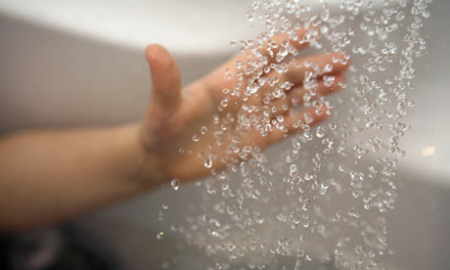|
|
|
中英文对照阅读:洗澡那些事儿(图)http://www.sina.com.cn
2009年09月08日 10:39 新浪教育
 洗澡的那些事
一项称为“淋浴力量”(Shower Power)的新运动在昨天正式启动了,其目的就是提倡缩短淋浴时间,从而节约用水。该运动的研究表明,与那种守旧、流行而且很可能出自厌恶女性者的观点相反,女性淋浴只比男性多用39秒时间。尽管许多像我这样的“绝顶好”男人无需洗发,却也省不了多少淋浴时间。 这是一个超乎你想象的重大环境问题——我们清洁梳洗的方式对我们的日常用水量很可能具有重大影响。在英国,我们每个人目前每天平均使用约150升水(这还没算上内含水,不然我们每天的间接耗水量还将增加3000多公升),而英国政府希望,到2030年,英国人均日用水量减少到130升。麻烦的是,目前人均用水量实际上每年增长1%左右。 所以,让我们回到前面提到的那项调查,找出问题的根源。调查显示,绝大多数女性(71%)淋浴时间在10分钟之内,四分之一的女性(26%)的淋浴时间能够控制在五分钟之内。这两个比例与男性的75%及30%相比,不过略低一些。有意思的是,淋浴时间在年龄上也存在一些差异: 年龄越大,淋浴时间越短。55岁及以上年龄组的人(平均淋浴时间:8分41秒)比18至24岁的年轻人(平均淋浴时间:13分26秒)快五分钟。而且在55岁及以上的人当中,有超过三分之一(39%)的人甚至能将淋浴时间控制在5分钟之内。这是否意味着更为"资深成熟"的人对个人卫生较为草率,或是较为直截高效,亦或是出于一种根深蒂固的生态意识及对水资源保护的深切关注? 当然,所有这些擦擦洗洗不仅需要用水,还需要消耗能源。个人洗浴用水占家庭总用水量的33%,而热水则是继室内供暖之后的第二大家庭能源开销。日益增加的水电费甚至足以令最爱缸浴的人改为淋浴。最近出现了一些新的趋势,比如联合利华(Unilever)的沐浴露销量不断上升,这些趋势证实,出于省钱省水的考虑,公众正从泡澡转向淋浴。除了淋浴后不必费力擦洗浴缸壁上残留的泡沫水垢线(难道只有我这么做?)这一明显利好之外,一般来说,淋浴比缸浴好,因为耗水相对较少。但是,这还取决于两大注意事项:你的淋浴方式,还有你左擦右洗上挠下搓耗时多久。 缸浴通常用水80升左右,而电动淋浴器平均每分钟喷水约6升。所以,要想达到缸浴的耗水标准,你必须在十三分钟多一点的时间内,在淋浴喷头下使劲搓洗按时“收工”。但是,如果你用的是每分钟喷水15升的强力淋浴器,在这种情况下,你只能在五分钟之内以迅雷不及掩耳之势迅速地涂抹冲洗干净。这样的话,为节约用水起见,你还是缸浴为好。 当然,还有可以使淋浴更为环保的办法,比如曝气淋浴喷头,这种喷头将空气混入喷水之中,模仿强力淋浴器的效果,但不像口渴的大象那样大量耗水。但是,就像生活中的其他许多事情一样,晨浴对环保影响最大的关键是时间,时间决定一切。了解你每天晨浴耗水量的最佳办法就是使用淋浴定时器以及水表。 我很想知道,你淋浴要花多长时间,以及在减少你自己或者你那淋浴时常常“任时流逝任水流”的室友的用水量方面,你的成效如何。是否有人甚至每天与他人一同淋浴?请在文章后的评论留言中告诉我吧。 【英文原文对照】 Let's talk dirty. How dirty are you? How long does it take you to scrub yourself clean of a morning? Research by a new "Shower Power" campaign launched yesterday – in a bid to save water by encouraging short showers – shows that contrary to lazy, popular and potentially misogynist belief, women only spend a mere 39 seconds longer in the shower than men. Despite the fact that many men like myself are clearly follicularly challenged and don't need to wash our hair, we're not much faster。 This is a bigger environmental issue than you might think – the way we choose to exfoliate and freshen up has potentially dramatic impacts on our daily water consumption. In the UK each of us currently use around 150 litres a day (let's not even start on the embedded water, which adds over 3,000 further litres to our indirect daily quaffing) and the government wants individuals' daily water consumption to be cut to 130 litres by 2030. The trouble is water consumption is actually increasing by about 1% a year。 So back to that survey to find the culprits. The vast majority of women (71%) apparently take showers of 10 minutes or less and a quarter of women (26%) manage to take showers of five minutes or less. This is only slightly below the number of men who do so (75% and 30% respectively). There are also intriguing differences on age, with time spent in the shower decreasing with increasing age. The 55s and over (mean shower time: 8 mins, 41 seconds) are five minutes faster than people aged 18 to 24 (mean shower time: 13 mins 26 seconds) with well over a third (39%) of people aged 55 or over even managing to shower in five minutes or less. Does this suggest a slap-dash approach to personal hygiene in the more mature, a no-nonsense efficient approach, or a deep seated eco-consciousness and concern about water conservation? Of course, all this scrubbing and lathering doesn't just use water – it uses energy too. Personal washing accounts for around 33% of the water used in the home and hot water is the second largest consumer of domestic energy after space heating. And rising bills are enough to make even the most bath-fond switch to showers. There have been some recent trends, such as the rise in shower-gel sales by Unilever, that confirm a money- and water-saving-inspired shift from bathing to showering. Apart from the distinct advantage of not having to scrub the tide-mark of scum from around the bath rim when you have a shower (or is that just me?), generally showers are better than baths as they use much less water. However, this comes with a couple of big fat caveats: what type of shower you have and how long you prance around in it。 A typical bath uses around 80 litres of water whereas the average electric shower sprays out about six litres a minute. So you'd have to be soaping yourself vigorously for over 13 minutes to use the same amount of water as that bath. But if you have a power shower that pumps out up to 15 litres per minute, in which case you have only 5 minutes of swift slathering before, from a water conservation perspective, you might as well have had that bath。 There are ways to make your shower even greener, of course, such as aerating shower heads that mix in extra air to mimic the effect of a power shower without the water consumption of a thirsty elephant. But when it comes to the biggest environmental impact of your morning wash, like so many things in life, timing is everything. The best way to understand how much water your morning sluice consumes is to get your hands on a shower timer and a water meter。 I'd be interested to hear how long you spend in the shower - and how successful you've been in cutting your water use, or your shower-hogging partner's use. Has anyone gone so far as sharing daily showers? Let me know in the comments。 网友评论
【发表评论】
企业服务 |




